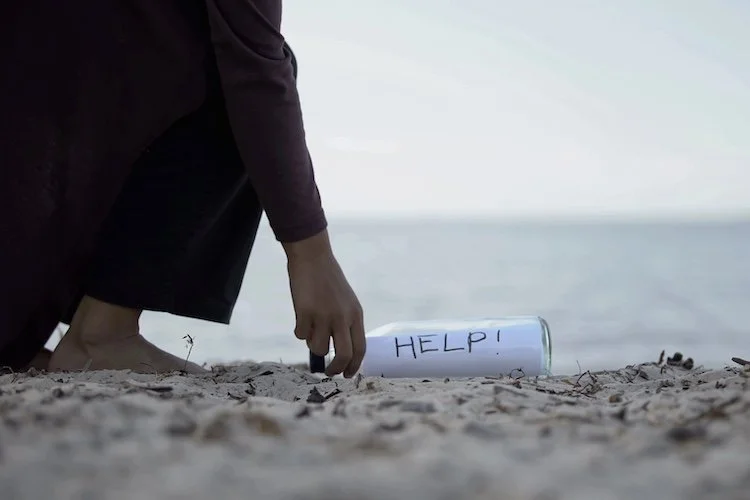Finding Hope in a Troubling World: Navigating Feelings of Helplessness
In our current world, it often feels overwhelming to sort through the intensity of headlines that scream sadness, conflict, and despair. Each day can bring new scenes of chaos that test our emotional resilience. It’s completely natural to feel helpless and hopeless at times when confronted with such news.
These days, being exposed to the news, including through social media, can lead to secondary, or “vicarious” trauma symptoms, as we may begin to internalize the trauma of others, experiencing feelings of fear, hopelessness, or emotional exhaustion.
Vicarious trauma refers to the emotional and psychological impact that can occur when someone is exposed to the traumatic experiences of others, such as those who work in helping professions like therapists, social workers, or first responders.
A lack of control, coupled with pervasive negativity, can fuel our sense of helplessness. When we recognize that something’s wrong or missing, but perceive that circumstances are beyond our control, we often feel powerless to initiate change. When it persists for too long, a perception of helplessness can morph into hopelessness.
The psychological root of helplessness and hopelessness can be linked to experiences of trauma, prolonged stress, and chronic negative feedback, among other emotional issues.
Cognitive distortions, such as catastrophizing or overgeneralizing bad experiences, can exacerbate these feelings.
Fortunately, there are several things you can do to help you feel more in control of your world and more hopeful about the future.
Acknowledge Your Feelings of Hopelessness and Helplessness
Take a moment to reflect on your thoughts, behaviors, and emotions. Signs of helplessness and hopelessness may include persistent negative thinking, a lack of motivation, feeling overwhelmed by tasks, withdrawing from social interactions, and difficulty finding pleasure in activities that once brought joy. Being aware of changes in sleep patterns, appetite, or general mood can also be indicators.
Know that your feelings are valid. Whether you’re experiencing anger, frustration, anxiety, depression, grief, or a slew of other emotions, you’re not alone. Many people are grappling with similar feelings.
Engage and Connect
Recognizing that shared humanity can often ease our burdens when feelings of helplessness begin to seep in, one of the most profound actions we can take is to connect with our community.
Engaging with others who share similar concerns fosters a sense of unity and belonging. Whether it’s through local gatherings, social media platforms, or volunteer efforts, being part of a supportive community can remind us that we are not isolated.
Related: Navigating Relationships Across Political Divides
Talking about our feelings with friends, family, or even a therapist or support group can be incredibly therapeutic. Sharing our worries can provide relief and lead to collective action, giving us a sense of direction amid despair.
Focus on What You Can Control
In addition to seeking connection, it’s crucial to focus on what we can control. While we may not be able to change world events, we can influence our personal environments. Taking small, actionable steps can help restore a sense of agency. This could mean reducing personal consumption of news, engaging in local activism, or even writing to your representatives about issues that matter to you. Each little action can create ripples of change. By redirecting our energy towards positive contributions, we not only help others but also cultivate hope within ourselves.
Create an Emotional Safety Zone
Mindfulness and self-care experiments can also provide a refuge in these turbulent times.
Practicing mindfulness gives us the tools to remain present, reducing anxiety about the future. Simple practices like meditation, deep breathing exercises, or spending time in nature can help us ground ourselves amidst chaos. Additionally, prioritizing self-care—whether it’s a warm bath, a good book, or a favorite hobby—allows us the space to recharge our emotional batteries. Remember, caring for ourselves is not selfish; it’s necessary, particularly when facing overwhelming external challenges.
Cultivating a gratitude practice can also be a powerful counterbalance to feelings of helplessness. By intentionally reflecting on what we appreciate in our lives, we can create a mental shift that highlights the positive. This can be as simple as keeping a gratitude journal where you jot down three things you’re thankful for each day or expressing appreciation to loved ones. Focusing on the goodness that exists, however small, can remind you of the light amid the darkness we sometimes face.
Related: Finding Awe in Everyday Moments
Invite Joy; Foster Hopefulness
It can be difficult to reconcile personal joy with the awareness of others’ suffering. It’s important to remember that celebrating holidays or experiencing happiness doesn’t diminish the struggles of others.
Embracing joy can be a form of resilience and hope, which may inspire and uplift those around us. It’s helpful to approach celebrations with sensitivity and support for those in need, allowing us to honor both our own feelings and the experiences of others.
Hope is not just an abstract ideal; it’s something we can cultivate daily. As we learn to navigate feelings of helplessness, focusing on the positive changes we can create, nurturing connections, taking care of ourselves, and acknowledging the good in life can help illuminate paths forward.
While the world can feel daunting, we possess the inner strength to rise and respond with compassion and resilience. You are not alone on this journey; together, we can find ways to move from hopelessness to hope.
Note: If you find these feelings weighing heavily on you, it could be beneficial to reach out for support from friends, family, or a mental health professional, who can help you understand and process your emotions..
You don’t have to go it alone.
If you’re interested in learning more about psychotherapy, psychoanalysis, couples therapy, or other therapy services we offer, please contact us by submitting this form or by phone at (708) 480-2813. We’ll be happy to answer any questions you might have.




